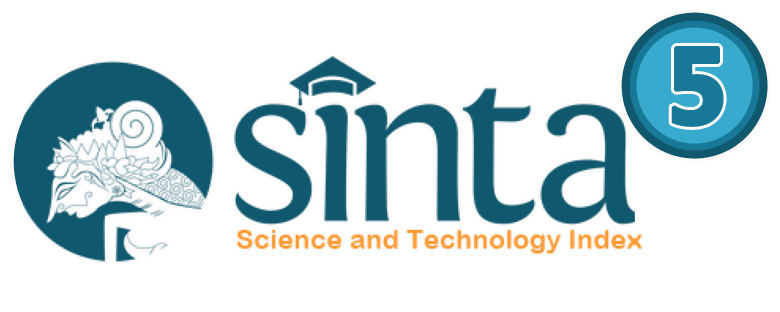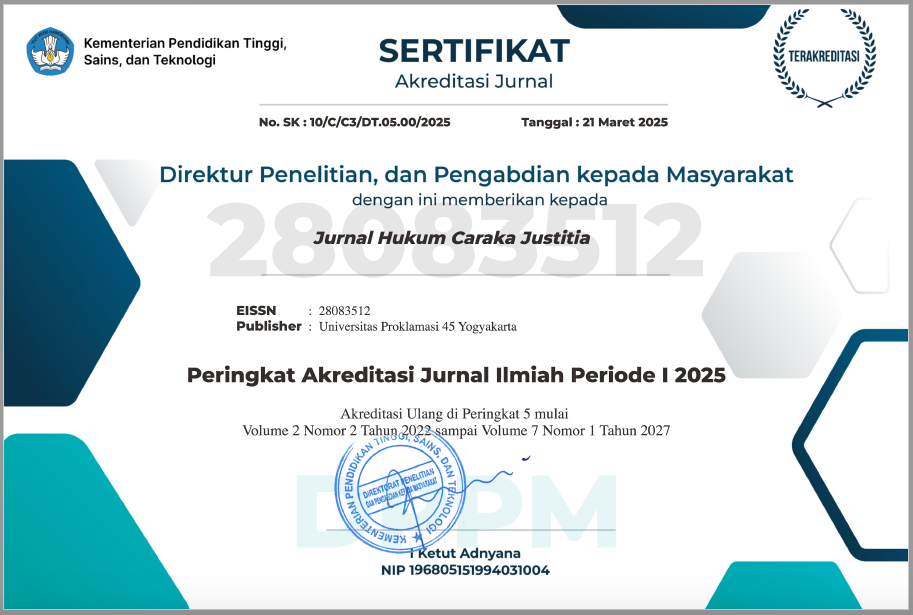Perlindungan Hukum Terhadap Korban Eksploitasi Seksual pada Tindak Pidana Perdagangan Orang di Yogyakarta
DOI:
https://doi.org/10.30588/jhcj.v4i2.1972Keywords:
Human Trafficking, Victims, Sexual Exploitation, Legal ProtectionAbstract
Legal protection for victims should be considered in the running of justice in Indonesia. Protection of victims talks about fulfilling a victim's rights, both in and after the judicial process. One form of legal protection that is quite interesting to discuss is related to legal protection for victims of sexual exploitation. This research seeks to answer the forms of protection for victims of sexual exploitation of criminal acts of human trafficking in the Special Region of Yogyakarta and the obstacles in implementing legal protection for victims of sexual exploitation of criminal acts of human trafficking in the Special Region of Yogyakarta. This type of research is field research using an empirical juridical approach.
The results of this research show that legal protection for victims of sexual exploitation (sex trafficking) of criminal acts of human trafficking in the Special Region of Yogyakarta has not been fulfilled, because there are still victims who are neglected due to several factors, including, legal officials who lack competence in handling victims of sexual exploitation. Victims who are not cooperative in the protection process or law enforcement process, inadequate protection facilities, including shelters as rehabilitation places whose needs have not been met, as well as a team of psychologists and legal counselors who are not proportional to the number of victims.
The obstacles to implementing forms of legal protection for victims are that the mechanism for blocking the assets of perpetrators or convicts has not been regulated, causing the right to restitution not to be fulfilled optimally. Low public knowledge and awareness of exploitation and its impacts, causes victims not to feel like they are victims of sexual exploitation.
References
Artikel Jurnal
Adisti, Neisa Angrum, Alfiyan Mardiansyah. “Permasalahan Pelaksanaan Restitusi Bagi Pelaku Tindak Pidana Perdagangan Orang”. Simbur Cahaya 26, no. 1 (Juni 2019): 1–15. https://dx.doi.org/10.28946/sc.v26i1.339.
Adiyuwan, Yohanes Kristian. “Perencanaan dan Implementasi Perlindungan Perempuan dan Anak Korban Kekerasan di DIY (Studi Pada P2TPA “RDU” DIY)”. Jurnal Ilmiah Administrasi Publik (JIAP) 2, no. 1 (2016): 27-38. https://doi.org/10.21776/ub.jiap.2016.002.01.4.
Azizurrahman, Syarif Hasyim. “Pembaharuan Kebijakan Pidana Kejahatan Perdagangan Orang (Studi Di Wilayah Perbatasan Kalimantan Barat-Sarawak)”. Yustisia 3, no. 2 (Agustus 2014): 88-99. https://doi.org/10.20961/yustisia.v3i2.11100.
Jihan, Annisa Andari. “Analisis Viktimisasi Struktural Terhadap Tiga Korban Perdagangan Perempuan dan Anak Perempuan”, Jurnal Kriminologi Indonesia 7. no. III (Desember 2011): 307 – 319. https://core.ac.uk/download/pdf/298620178.pdf.
Panjaitan, Ananda Chrisna D. “Harmonisasi Undang-Undang Nomor 21 Tahun 2007 Tentang Pemberantasan Tindak Pidana Perdagangan Orang Dengan Protokol Palermo Dalam Perlindungan Perdagangan Orang Di Indonesia.” Yustita 16, no. 1 (Mei 2022), 1-13. https://doi.org/10.62279/yustitia.v16i1.895.
S, Eko Budi, Wancik. “Perlindungan Hukum terhadap Korban Tindak Pidana Perdagangan Orang Dalam Perspektif Sistem Peradilan Pidana Indonesia dan Malaysia”. Wajah Hukum 4, no. 2 (Oktober 2020): 261–275.
Watupongoh, Timothy, Roy R. Lembong. “Perlindungan Hukum Atas Korban Pemerkosaan Dalam Proses Penegakan Hukum Pidana”, Lex Privatium IX, no. 8 (Juli 2021): 195-204.
Buku
Mansur, Arief M Didik. Urgensi Perlindungan Korban Kejahatan: Antara Norma dan Realita. Jakarta: Raja Grafindo Persada, 2008.
Waluyo, Bambang. Viktimologi: Perlindungan Korban & Saksi. Jakarta: Sinar Grafika, 2011.
Wrassih, Esmi, Karolus Kopong Medan (ed), Mahmutarom HR (ed). Pranata Hukum : Sebuah Telaah Sosiologis. Semarang: Suryandaru Utama, 2005.
Laporan Global
United Nations Office On Drugs And Crime. “Global Report On Trafficking In Persons 2022”. Vienna: UNODC 2022. https://www.unodc.org/documents/data-and-analysis/glotip/2022/GLOTiP_2022_web.pdf.
Internet
US Department of State. “2023 Trafficking in Persons Report”. https://www.state.gov/reports/2023-trafficking-in-persons-report/ (diakses 20 November 2023).
Peraturan Perundang-undangan
Undang-Undang Nomor 1 Tahun 2023 tentang Kitab Undang-Undang Hukum Pidana.
Undang-Undang Nomor 8 Tahun 1981 tentang Hukum Acara Pidana.
Undang-Undang Nomor 31 Tahun 2014 tentang Perubahan atas Undang-Undang Nomor 13 Tahun 2006 tentang Perlindungan Saksi dan Korban.
Undang-Undang Nomor 21 Tahun 2007 tentang Pemberantasan Tindak Pidana Perdagangan Orang.
Peraturan Daerah Provinsi Daerah Istimewa Yogyakarta Nomor 6 Tahun 2014 tentang Perlindungan Terhadap Korban Tindak Pidana Perdagangan Orang.
Peraturan Gubernur Daerah Istimewa Yogyakarta Nomor 1 Tahun 2022 tentang Rencana Aksi Daerah Pencegahan dan Penanganan Korban Tindak Pidana Perdagangan Orang Tahun 2022-2026.
Downloads
Published
How to Cite
Issue
Section
License
Copyright (c) 2024 Gilang Kresnanda Annas, Ahmad Izzul Asyrofisyauqi

This work is licensed under a Creative Commons Attribution 4.0 International License.
Authors who publish with JHCJ agree to the following terms:
Authors retain copyright and grant the JHCJ right of first publication with the work simultaneously licensed under a Creative Commons Attribution 4.0 International License that allows others to share (copy and redistribute the material in any medium or format) and adapt (remix, transform, and build upon the material) the work for any purpose, even commercially with an acknowledgment of the work's authorship and initial publication in JHCJ.
Authors are able to enter into separate, additional contractual arrangements for the non-exclusive distribution of the journal's published version of the work (e.g., post it to an institutional repository or publish it in a book), with an acknowledgment of its initial publication in JHCJ. Authors are permitted and encouraged to post their work online (e.g., in institutional repositories or on their website) prior to and during the submission process, as it can lead to productive exchanges, as well as earlier and greater citation of published work (See The Effect of Open Access).














